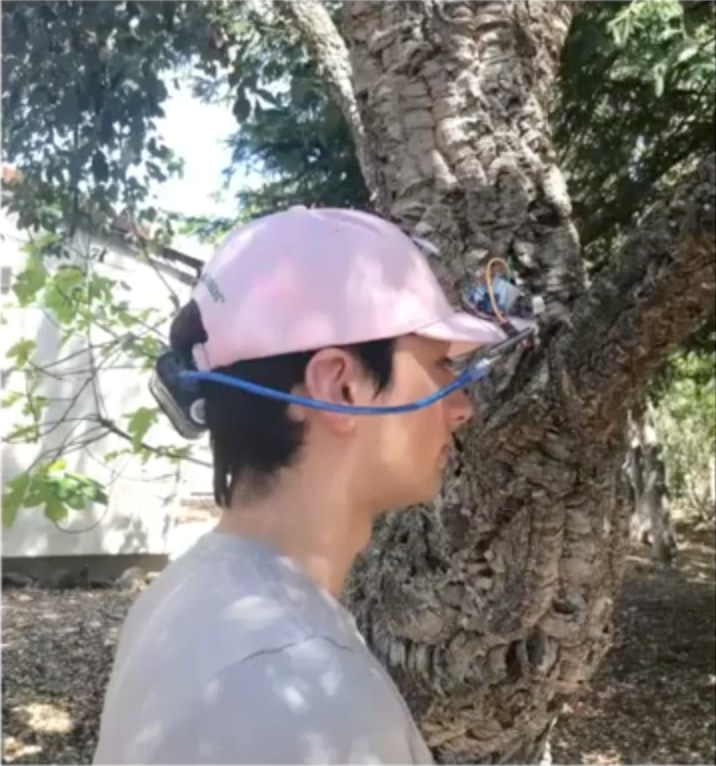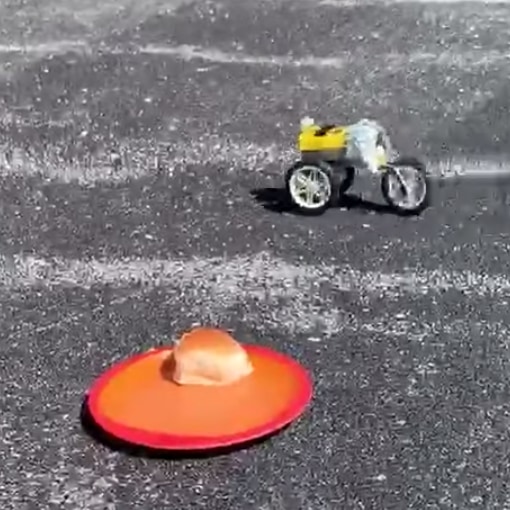The Design and Innovation Challenge, hosted by the Department of Technology Leadership & Innovation (TLI), has become a highlight of every semester. The twice-annual idea showcase serves as the finale of three of TLI’s courses – TECH 12000 (Design Thinking in Technology), TECH 22000 (Designing Technology for People) and TECH 34000 (Prototyping Technology for People) – during which students from various Polytechnic majors combine their talents and knowledge to analyze real-world problems. Students then incorporate human-centered design to brainstorm, design and build working prototypes of their ideas.
“Our group was very fortunate to have a member with good experience in robotics who helped bring our design to life,” said Arden Friend, junior in human resource development, whose team created a robotic device to ward animals away from solar panels. “Part of the design process is ideation, where we were free to come up with any prototype ideas. We could be as creative as we wanted and there were no wrong answers. After receiving feedback and repeating testing, we narrowed in on a design that we thought would be fun to construct, but also knew it would be the most effective. The process of having our robot being built and seeing it work on the testing grounds was really neat and fulfilling!”
During the showcase, teams with the semester’s most innovative solutions demonstrate their prototypes to two different groups of interested parties:
1. The general public, who vote for the crowd favorite award, and
2. The judges, who determine the first, second and third place winners, based on:
- Ability to sell the idea
- Completeness of the project
- Coolness factor
- Working prototype
- Documented data analysis
Jared Vanscoder is a program manager with Autodesk Education, which makes design software and sponsors design competitions across the country. In 2017, Vanscoder met with Dean Gary Bertoline, Nathan Mentzer, associate professor of engineering/technology teacher education, Greg Strimel, assistant professor of technology leadership & innovation, and Shawn Farrington, senior lecturer, to help devise the Polytechnic’s inaugural design competition. Vanscoder is impressed with the size and scope of the event and with the caliber of ideas produced by students.
“Design challenges such as this exist across similar programs. The main difference here is the scale: TECH 120 is a HUGE course that does a great job of quickly running students of all experience levels and professional interests through the design process,” said Vanscoder. “That’s a critically needed skill for today’s workforce.”
The finalists don’t take their presentations lightly. Each student on the winning teams receives a share of more than $25,000 in prize money and can opt to receive a scholarship for TLI’s Design and Innovation minor to support their design education.
 An added challenge: In-person meetings became long-distance web calls
An added challenge: In-person meetings became long-distance web calls
In years past, student teams worked together, in person, to create their prototypes. However, 2020 was not like years past.
“Working apart for the last month changed our whole routine,” said Friend. “Thankfully, we worked effectively and completed our project remotely without too much issue.”
Mentzer had faith that his students would take the setback in stride and even learn from it.
“The world’s economy thrives on teams of people collaborating in person and remotely,” said Mentzer. “Our course prepares students with skills and experiences requisite for success in the global marketplace.”
Also, unlike in previous years, there would be no in-person pitches to event attendees. Instead, the finalists created video presentations of their mock-ups, enabling more than one hundred students, faculty and staff members to vote online for their favorite.
Awards
Crowd Favorite: Helpful Headgear
An electronic sensor that, when attached to a ball cap, vibrates to alert a sight-impaired wearer they are approaching hazards at head level, such as tree branches and street signs.
Team members:
- Justin DeRosa, junior in mechanical engineering technology
- Brandon Mair, junior in mechanical engineering technology
- Justin Rudecki, senior in mechanical engineering technology
- Stephen Walters, sophomore in data visualization
“It was great to make something that not only worked, but something that could actually help people in the real world,” said Rudecki.
 Overall Design and Innovation Winner: Scary Roomba
Overall Design and Innovation Winner: Scary Roomba
A programmable, wheeled, mini-vehicle that, when in motion, humanely frightens away animals, preventing them from nesting in and damaging solar panels.
Team members:
- Arden Friend, junior in human resource development
- Drew Kanya, junior in system analysis & design
- Reb Kelecy, sophomore in web programming & design
- Max Smolic, freshman in cybersecurity
“Our team decided to focus on the challenge of making solar energy economical because, in recent years,” Friend said, “we have become much more alert to the declining state of the environment and wanted to do something to help out.”
